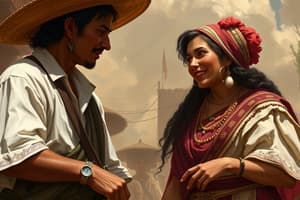Podcast
Questions and Answers
¿Quién era parte de la alta burguesía en la sociedad industrial?
¿Quién era parte de la alta burguesía en la sociedad industrial?
Personas que ejercían la medicina, el periodismo y el alto funcionariado.
¿Qué describe mejor al proletariado?
¿Qué describe mejor al proletariado?
- Clases altas de la sociedad
- Personas con grandes riquezas
- Obreros que vendían su fuerza de trabajo (correct)
- Dueños de industrias
¿Cuál fue el objetivo del movimiento obrero?
¿Cuál fue el objetivo del movimiento obrero?
Mejorar las condiciones laborales de los trabajadores asalariados.
El marxismo debe su nombre a ______.
El marxismo debe su nombre a ______.
El anarquismo defendía la participación en las elecciones.
El anarquismo defendía la participación en las elecciones.
¿Qué es el imperialismo?
¿Qué es el imperialismo?
¿Cuál fue la colonia más importante del Imperio británico?
¿Cuál fue la colonia más importante del Imperio británico?
¿Qué ocurrió con la monarquía de Carlos IV a comienzos del siglo XIX?
¿Qué ocurrió con la monarquía de Carlos IV a comienzos del siglo XIX?
¿Quién fue obligado a abdicar en su hermano, José Bonaparte?
¿Quién fue obligado a abdicar en su hermano, José Bonaparte?
La guerra de la Independencia comenzó con una ______ popular el 2 de mayo de 1808.
La guerra de la Independencia comenzó con una ______ popular el 2 de mayo de 1808.
Flashcards
High Bourgeoisie
High Bourgeoisie
The wealthy upper class in industrial society, comprised of professionals like doctors, journalists, and high-ranking officials. They were the most powerful class, investing in and managing new industries.
Proletariat
Proletariat
The working class in industrial society, composed of factory workers who sold their labor for wages. They had low job qualifications and very low wages.
Working Class Movement
Working Class Movement
The collective actions of workers to improve their working conditions. It arose from the working class recognizing their difficult situation.
Marxism
Marxism
Signup and view all the flashcards
Bourgeoisie
Bourgeoisie
Signup and view all the flashcards
Proletariat (Marxist)
Proletariat (Marxist)
Signup and view all the flashcards
Communism
Communism
Signup and view all the flashcards
Imperialism
Imperialism
Signup and view all the flashcards
British Empire
British Empire
Signup and view all the flashcards
Spanish-French Alliance
Spanish-French Alliance
Signup and view all the flashcards
Treaty of Fontainebleau
Treaty of Fontainebleau
Signup and view all the flashcards
Motín de Aranjuez
Motín de Aranjuez
Signup and view all the flashcards
War of Spanish Independence
War of Spanish Independence
Signup and view all the flashcards
Afrancesados
Afrancesados
Signup and view all the flashcards
Fernando VII
Fernando VII
Signup and view all the flashcards
Study Notes
7. LA SOCIEDAD DE CLASES
-
Clases altas: Included the upper bourgeoisie, a diverse group encompassing professionals like doctors, journalists, and high-ranking civil servants. They were the most powerful class, investing heavily in new industries and demonstrating entrepreneurial spirit. They frequented theatres, opera houses, and social gatherings like balls, and spent summers at coastal resorts or spas.
-
Clase baja: Included the proletariat, workers in the industrial society who sold their labor. They performed jobs requiring minimal skill and earned very low wages, often barely enough to survive. This lack of income prevented upward mobility, and their workdays frequently exceeded 12 hours.
8. EL NACIMIENTO DEL MOVIMIENTO OBRERO
-
Definición de movimiento obrero: A collection of organized actions by wage earners to improve their working conditions. It emerged when the working class became aware of their unfavorable employment circumstances.
-
Bases ideológicas: Marxism and anarchism.
9. EL IMPERIALISMO
- Imperialismo: The expansion of a nation's dominance over other countries or territories. The 19th century saw this reach new levels.
10. IMPERIOS COLONIALES
- El Imperio británico: Held colonies globally, but India was a key area. Control of the Suez Canal and Egypt secured the route to India, prompting additional territorial acquisitions in Asia. British holdings also extended to Africa and Oceania including Canada.
La Crisis del Reinado de Carlos IV
- Context: The Spanish monarchy of Carlos IV's reign faced significant social and political unrest amidst the French Revolution and subsequent developments in Europe. Godoy's governance was criticized, contributing to growing discontent within Spanish society.
Studying That Suits You
Use AI to generate personalized quizzes and flashcards to suit your learning preferences.




